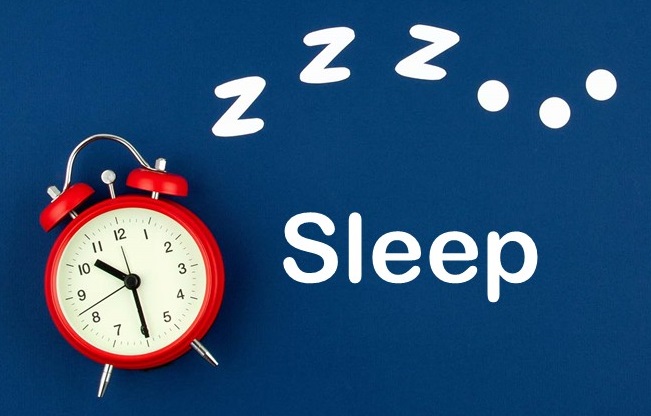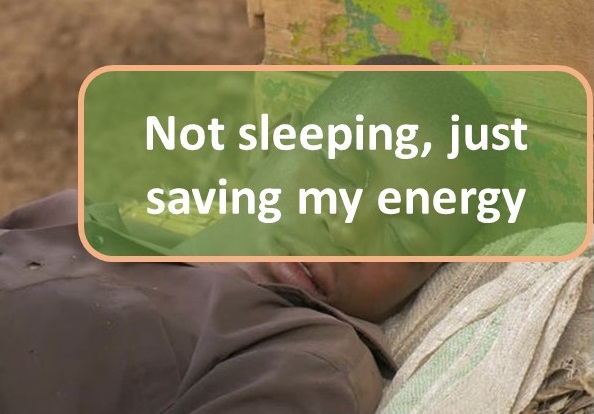
According to a recent literature review from Nigeria, basic knowledge about the scientific basis of sleep is low across communities in African countries.
So is the availability of healthcare providers with special training in sleep medicine and the availability of institutions and technical services dedicated to the care of sleep disorders.
Sleep is a universal and fundamental necessity for good population health irrespective of race, gender and nationality. However, different local factors, most especially socioeconomic status, may impact sleep quality and by extension the prevalence of sleep disorders between and within nation states.
Compared to other high income nations of the world, very few studies are available about the prevalence of sleep disorders across African countries and diverse cultural misinformation abound about the nature and purpose of sleep within the region.
The few available reports from Nigeria, South Africa and Ethiopia point to a wide range of 69%, 9.1% and 71.3% respectively in the prevalence of sleep disorders in different population study groups.
This indicates that sleep disorders is a serious population health issue in sub-Sahara Africa and more refined studies are needed to help shape public policy to address it.
The purpose of this general article is to provide the reader especially from Africa with credible and basic information about the science of sleep, hoping that it will assist in gaining insight into the importance of sleep and sleep health.
Other aspects of sleep, like sleep aids, causes and types of sleep disorders, diagnposis and management, etc., will be covered in separate reports.
Sleep is a complex but fascinating biological process that is still not fully understood.
Quality sleep is essential for physical, mental and psychological well-being.
Learning, memory processing, cellular repair, growth and brain development are among the most important functions of sleep.
Although the average adult spends approximately a third of the day sleeping, we still do not fully understand why people sleep.
In the past, sleep was thought to be a state in which the “body stops functioning, shuts down and takes a break.”
The truth is, we now know differently.
When you observe a sleeping person, s/he may appear inactive. But numerous sleep studies conducted in humans have confirmed that some body and brain functions are actually active during sleep than in the awake state.
So, what would be an appropriate definition of sleep?
Sleep can be defined as a temporary inactive state of the mind and body that is marked by altered alertness and awareness, reduced muscle movement and reduced interaction with the environment, while the brain is rejuvenating and memory is being strengthened.
Different brain waves have been identified and associated with different types and stages of sleep.
Two broad types of sleep are recognized:
Non-REM sleep occurs first and it transitions into what is called slow wave sleep or deep sleep. During this phase, body temperature and heart rate fall, and the brain uses less energy. People spend more period in Non-REM sleep.
REM sleep, also known as paradoxical sleep, represents a smaller portion of total sleep time. Dreams or nightmares occur during REM sleep and it is associated with fast brain waves, eye movements, reduced muscle tone, and suspension of several body functions.
NREM and REM sleep cycle an average of 90 minutes and occur about 4–6 times in a good night's sleep.
According to the American Academy of Sleep Medicine, NREM sleep occurs in three progressive stages: N1→ N2→ N3 and N4, the last two of which are collectively called delta sleep or slow wave sleep (SWS).
REM sleep on the other hand occurs as a person returns to stage 2 or 1 from a deep sleep. (i.e., N1 → N2 → N3/N4 → N2 → REM)
A greater amount of deep sleep (stage N3/N4) occurs earlier in the night, while REM sleep increases in the two cycles just before natural awakening.
Watch the video below for more insight into your sleep cycle.
Video: Understanding your sleep cycle
Four major reasons why we need to sleep are to:
1) Clear the brain of junk and restore brain health.
2) Strengthen memory.
3) Conserve energy.
4) Restore body balance.
As body temperature, heart rate, and brain oxygen consumption decrease during slow wave sleep, reduced rate of metabolism occurs. This enables restorative processes to occur in various body organs but more so in the brain.
The sleeping brain has been shown to remove waste products of metabolism at faster rate than during the awake state.

Men clearing waste from a premises
Image credit: Global recycling.
Sleep may also induce the production of molecules that help repair and protect the brain from metabolic end products generated during waking.
It is widely accepted that sleep supports the formation and storage of long-term memory, and generally strengthens previous learning and recalls. Its benefits depend on the phase of sleep and the type of memory.
For example, memory about people, places and things (so called declarative memory) appears to improve more during early sleep when slow wave NREM sleep predominates; while memory about skills and procedures (procedural memory) are improved during the late sleep cycle dominated by REM sleep.

Like the usb storage device shown, sleep supports memory storage, strengthening and recall.
During sleep the whole body is involved in lying still for considerable hours at a time.
For this reason, it is hypothesized that resting, repair and energy conservation are major reasons – but not the only reasons - why we sleep.
This makes sense if you think about it. You as a sleeper will use up less energy than someone that is awake. So, sleeping allows you to ramp down energy consumption and conserve available energy for later use.
Further evidence in support of the energy conservation function of sleep comes from the fact that even the small concentration of glycogen present in the brain relative to that in the liver increases during sleep, and is depleted through breakdown to glucose for energy during wakefulness.

Sleeping African male
Image credit: Motion Array
Also, certain hormones that help growth are known to be preferentially secreted during sleep. These hormones help to repair, restore and grow body organs.
Another interesting thought here is that sleep somehow improves the functioning of the immune system.
This may help explain the observation that people who are chronically sleep deprived are about three times more likely to get sick when exposed to the common-cold virus than people who get regular eight hours sleep or more.

Torso of black male body builder from the back.
Image credit: Pixabay
Sleep needs vary from person to person and for different age groups.
Although researchers have found that sleeping 6–7 hours each night correlates with longevity and cardiac health in an average adult, it still must be said that there is no ideal sleep duration that applies to everyone.
Children for example spend longer hours of the day sleeping and this has been shown to influence their learning ability, language skills, attention, impulsivity level and temperament.
That said, recommendations are available for adequate sleep duration at different ages of life (see table below).
Studies among students in the African countries of Rwanda and Ethiopia indicate that a number of factors influence the quality and duration of sleep. Findings in these studies are also supported by those from a similar study among university students in Turkey.
The influencers of the quality and duration of sleep are best considered under the following categories:
Each or a combination of these psychological factors do not promote better mental health for good sleep.
Social problems affect mental health and may directly or indirectly affect sleep quality.
Not getting enough hours or quality sleep will impact your health in many ways, both in the short and long term.
Development of
If you are having difficulty falling and staying asleep or having frequent waking episodes during sleep, try practicing these simple lifestyle behaviours (strategies) that are collectively referred to as “sleep hygiene”.
Sleep is a complex biological process. It is not simply a state of inactivity with temporary shutdown of body and brain functions. It is marked by stages of specific cyclical brain activity, wave patterns and physiological processes that help growth, repair and rejuvenation of the brain and body; enhance learning and memory and boost body immunity, etc. Several factors may impact sleep duration and quality. Tips on how to get better sleep are worthy of note and practice.
Related:
.jpg)
Sleep disorders - An African perspective: Types and symptoms
Slideshow: Who is at risk of major sleep disturbances?
Sleep medications: Types, Uses and Side effects
Resources
1. Komolafe, M.A., Sanus, A.A., Idowu, A.O., Balogun, S.A., Olorunmonteni, O.E., Adebowale, A.A., Fawale, M.B., Mosaku, K.S.: Sleep medicine in Africa: past, present, and future. J Clin. Sleep Med. 2021 Jun 1; 17 (6):1317-1321. doi: 10.5664/jcsm.9218. PDF Download:
2. Aragón-Arreola, J.F., Moreno-Villegas, C.A., Armienta-Rojas, D.A., De la Herrán-Arita, A.K.: An insight of sleep disorders in Africa. eNeurologicalSci. 2016 Feb 26; 3:37-40. doi: 10.1016/j.ensci.2016.02.006.
3. Nsengimana, A., Mugabo, E., Niyonsenga, J. et al. Sleep quality among undergraduate medical students in Rwanda: a comparative study. Sci. Rep. 13, 265 (2023).
4. US National Library of Medicine. Obstructive Sleep Apnea. Retrieved, February 3, 2023
5. Wondie, T. et al. Magnitude and correlates of sleep quality among undergraduate medical students in Ethiopia: cross -sectional study. Sleep Science and Practice, vol. 5, no. 1, 3 Mar. 2021. Abstract.
6. Altun, I., C?na, N., Dede, C.: The contributing factors to poor sleep experiences in according to the university students: A cross-sectional study. J Res Med Sci. 2012 Jun; 17(6):557-61. PMID: 23626634; PMCID: PMC3634295.
7. Robbins, R., Grandner, M.A., Buxton, O.M., Hale, L., Buysse, D.J., Knutson, K.L., Patel, S.R., Troxel, W.M., Youngstedt, S.D., Czeisler, C.A., Jean-Louis, G.: Sleep myths: an expert-led study to identify false beliefs about sleep that impinge upon population sleep health practices. Sleep Health. 2019 Aug; 5(4):409-417. doi: 10.1016/j.sleh.2019.02.002.
8. Adewole, O.: Pattern of sleep disorders among patients in a Nigerian family practice population. Ann Med Health Sci. Res. 2017; 7: 23-31.
10. Bogale, B., Wolde, A., Mohammed, N., Midaksa, G. and Bekele, B.B.: Poor sleep quality and factors among reproductive-age women in Southwest Ethiopia. Front. Psychiatry 13:913821. 3033. doi: 10.3389/fpsyt.2022.913821
11. Manzar, M.D., Bekele, B.B., Noohu, M.M. et al. Prevalence of poor sleep quality in the Ethiopian population: a systematic review and meta-analysis. Sleep Breath 24, 709–716 (2020). Abstract.
Published: February 4, 2023
© 2023. Datelinehealth Africa Inc. All rights reserved.
Permission is given to copy, use and share content freely subject to attribution as to source.
DATELINEHEALTH AFRICA INC., is a digital publisher for informational and educational purposes and does not offer personal medical care and advice. If you have a medical problem needing routine or emergency attention, call your doctor or local emergency services immediately, or visit the nearest emergency room or the nearest hospital. You should consult your professional healthcare provider before starting any nutrition, diet, exercise, fitness, medical or wellness program mentioned or referenced in the DatelinehealthAfrica website. Click here for more disclaimer notice.